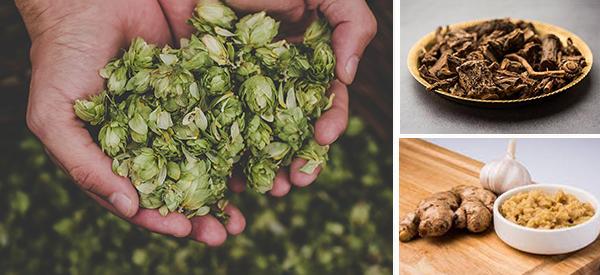
Anti-Inflammatory Diet: The 10 Most Powerful “Autoimmune Herbs”
Autoimmune diseases can be devastating. While some are more well known, such as lupus and rheumatoid arthritis, there are hundreds of diseases where the body’s own immune system turns on itself. Rather than protecting the body from outside threats, the immune system sees the body itself as a threat and reacts accordingly. In this article, you’ll see why you should follow an Anti-Inflammatory Diet and which are The 10 Most Powerful “Autoimmune Herbs”
While there are drugs to treat autoimmune diseases, many people prefer more natural methods or to blend the two. The following are herbs that work best to support the body’s immune system while reducing its attack on the body.
Hops
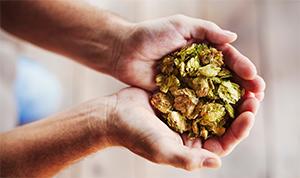 Commonly used in beer, hops actually have sedative and anti-inflammatory properties. The herb has been studied and shown to be a safe alternative to ibuprofen for reducing inflammation in autoimmune flares.
Commonly used in beer, hops actually have sedative and anti-inflammatory properties. The herb has been studied and shown to be a safe alternative to ibuprofen for reducing inflammation in autoimmune flares.
Recipe: The best way to use hops is to turn them into an extract. This may be done by soaking two oz. of fresh hops in two cups of vodka for six weeks. You can also purchase hops extract. While making tea from hops is another option, it doesn’t allow for the full effect, but is a good alternative if you’re avoiding alcohol. To make tea, add one or two hops to a cup of boiling water and steep for five minutes. You can take this tea daily or two mg. of the extract.
Sarsaparilla
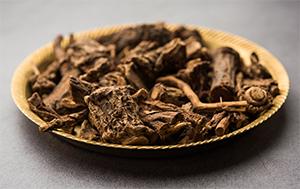 This unique herb naturally contains steroids, so it’s ideal for reducing immune system attacks. It has been used in combination with other herbs to treat Lyme disease, but is most powerful when used for autoimmune diseases that attack the skin.
This unique herb naturally contains steroids, so it’s ideal for reducing immune system attacks. It has been used in combination with other herbs to treat Lyme disease, but is most powerful when used for autoimmune diseases that attack the skin.
Recipe: The root of this plant is where the majority of the benefits lie. You can dry the roots and then grind them into powder to make tinctures or tea. Add a tablespoon of ground root to a cup of boiling water and steep for up to five minutes. Drink one to two cups daily to see the best results.
Yucca
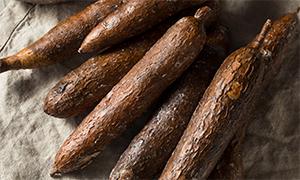 Normally used as a decorative plant, yucca is actually very useful when combatting an immune system gone rogue. The root is the part you’ll be using for medicinal purposes, but you should be careful, as many plants are labeled yucca. You specifically want Yucca schidigera.
Normally used as a decorative plant, yucca is actually very useful when combatting an immune system gone rogue. The root is the part you’ll be using for medicinal purposes, but you should be careful, as many plants are labeled yucca. You specifically want Yucca schidigera.
Recipe: The root may be dried and powdered to make tinctures or tea. If making tea, use one teaspoon in a cup of boiling water and steep for 6-8 minutes. You may blend with another herb for better flavor. Drink the tea two or three times a day, as needed.
Stinging Nettle
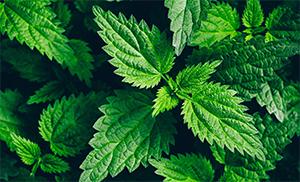 You may not think of stinging nettle as an herb, but it is. You can use the leaves fresh topically or orally, but they’re also good in tea.
You may not think of stinging nettle as an herb, but it is. You can use the leaves fresh topically or orally, but they’re also good in tea.
Recipe: For arthritic conditions, the fresh leaves can be rubbed directly on the affected area, twice a day. Over the course of a week or so, you should see improvement in the pain and inflammation. A less painful option is to brew the leaves into a tea, by adding a quarter cup of fresh leaves to very hot water and letting it sit for 10 minutes. Alternatively, you can use dried, crushed leaves to make tea, adding a tablespoon to hot water. This can be taken two or three times a day to reduce inflammation in the body.
Turmeric
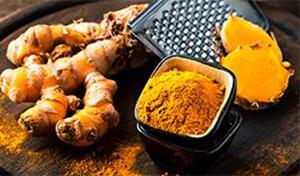 You likely know turmeric from curries, but the root is also a powerful medicinal ingredient. It is extremely useful in fighting inflammation, which is one of the main effects of autoimmune disease. Unfortunately, it can be difficult for the body to absorb curcumin, the active ingredient in turmeric, so many people take supplements instead of using the root directly.
You likely know turmeric from curries, but the root is also a powerful medicinal ingredient. It is extremely useful in fighting inflammation, which is one of the main effects of autoimmune disease. Unfortunately, it can be difficult for the body to absorb curcumin, the active ingredient in turmeric, so many people take supplements instead of using the root directly.
Recipe: However, if you are using the fresh root, tea is the best way to make use of it and increase the bioavailability of the curcumin in it. You can steep a gram of freshly grated turmeric root in a cup of hot water for 5-10 minutes and drink that three times a day to help with autoimmune flares.
Ginger
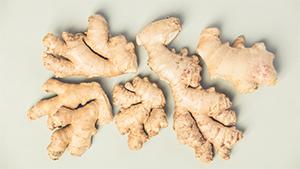 You can easily add ginger to your regular meals if you want a little extra zing. Its medicinal properties are found in the root and are strongest when fresh.
You can easily add ginger to your regular meals if you want a little extra zing. Its medicinal properties are found in the root and are strongest when fresh.
Recipe: You can use the root to make a tincture that you can add 2-3 drops of to your tea each day, or you can eat it as is.Two grams of raw ginger has been shown to reduce pain and inflammation when taken daily. You can also use it in tea, dropping two or three slices into hot water and adding lemon and honey, which can also help with the immune system. This can be taken daily.
Garlic
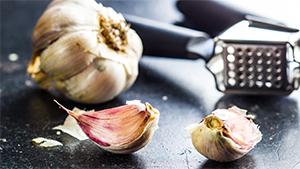 Did you know that this delicious addition to your food is actually medicinal? It can help ease arthritis pain and help your immune system regulate itself. It’s also very easy to incorporate into your diet. It’s virtually impossible to overdose on garlic, so feel free to add it to everything you eat.
Did you know that this delicious addition to your food is actually medicinal? It can help ease arthritis pain and help your immune system regulate itself. It’s also very easy to incorporate into your diet. It’s virtually impossible to overdose on garlic, so feel free to add it to everything you eat.
Recipe: You should aim for 3-5 cloves a day for the best benefits and be sure to use fresh garlic, not dried. If you’re not a fan of the stuff, you can chop it finely and put into capsules, or try roasting it to mellow the flavor.
Sweet Wormwood
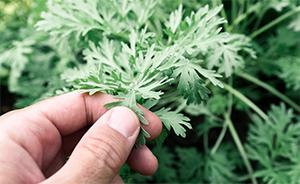 This version of wormwood, also known as Sweet Annie, is an Asian herb that now grows throughout North America. It was originally used to treat malaria, but has since been shown to have beneficial properties for those suffering from autoimmune diseases, too.
This version of wormwood, also known as Sweet Annie, is an Asian herb that now grows throughout North America. It was originally used to treat malaria, but has since been shown to have beneficial properties for those suffering from autoimmune diseases, too.
Recipe: Sweet wormwood can be used dried or fresh to make tea, but should only be used in hot water, not boiling. Boiling the tea will destroy the beneficial properties. Use a tablespoon of fresh or a teaspoon of dry wormwood in a cup of hot water and steep for five minutes.
Cat’s Claw
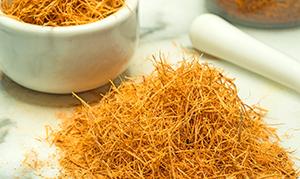 While not a staple in most herb gardens, cat’s claw has proven to be a very useful plant. It’s used in a variety of medicinal capacities, but it has been shown to be useful in fighting Lyme’s disease, arthritis, and other autoimmune disorders.
While not a staple in most herb gardens, cat’s claw has proven to be a very useful plant. It’s used in a variety of medicinal capacities, but it has been shown to be useful in fighting Lyme’s disease, arthritis, and other autoimmune disorders.
Recipe: The root bark is the bit you’ll use for reducing immune response in the body. To prepare it, use 1 gram or a quarter teaspoon of the fresh or dried root bark in a cup of water. Boil for 10 minutes and strain out the bark. You can drink this concoction three times a day.
Aloe Vera
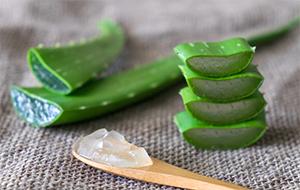 Aloe vera is a succulent that has long been used to treat wounds and injuries, but it can also be used to help with autoimmune issues. It’s relatively easy to cultivate, so many gardeners will have it in their home already.
Aloe vera is a succulent that has long been used to treat wounds and injuries, but it can also be used to help with autoimmune issues. It’s relatively easy to cultivate, so many gardeners will have it in their home already.
Recipe: Aloe may be applied to a painful joint or skin flare, but you can also take it by mouth. To prepare aloe juice, cut the clear gel part of the aloe into one-inch cubes. Add 8-10 of these to 6 cups of water and blend until smooth. Add flavoring of your choice, as the juice can be somewhat bitter. You can drink up to 8 oz. a day or one normal sized glass of juice. It can have a laxative effect if too much is taken.
These herbs can all be used to help ease the symptoms of autoimmune diseases, but it’s a good idea to test which ones work best with your particular issues. Different herbs will affect different people and diseases in unique ways.
If you’re currently taking any medication for your immune issues, you should talk to your doctor before taking any herbal remedies.
You may also like:
 9 Natural Remedies for High Cholesterol and Blood Pressure
9 Natural Remedies for High Cholesterol and Blood Pressure
Erratic Blood Sugar? Never Eat This Veggie (Video)
How to Make Anti-Inflammatory Band-Aid Using Plantain
Why Put Onions in Your Socks Before Sleeping
9 Natural Remedies that People with Diabetes Will Find Useful

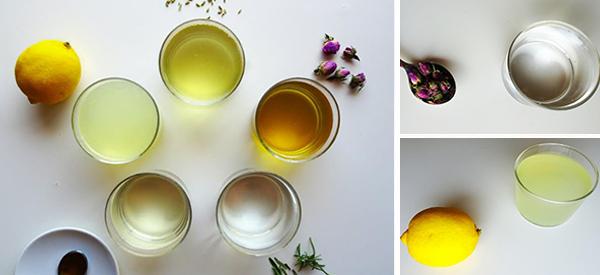
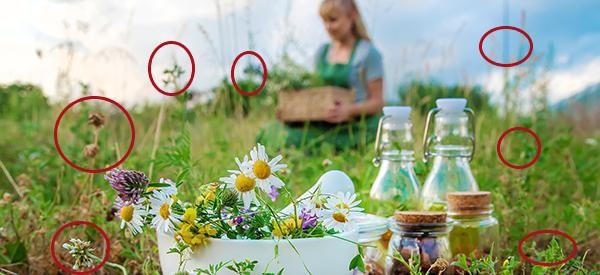

your failure to use Latin names re herbs is disturbing to me. I have to do too much research to verify you assertions
Wow, such a lovely comment. Complains are not helping, do participate and help instead 🙏
I really do not think that it is necessary to know Latin names at all. I don’t see how this would matter to anyone…
While the information you provided is essentially valuable
Thank you ❤️
Andrea and Marina:
However it is true. Latin names assure us that we are getting the correct ingredient or herb or plant to use. NOT using the Latin names is confusing and can lead to horrible consequences.
Also disturbing is a list of sources. WHERE is this information coming from? Are the sources from reliable written articles? Almost every blog I read has a list at the bottom with the source of the information posted.
This blog should do the same.
That comment was called CONSTRUCTIVE CRITICISM.
No blog is perfect and has ALL the answers.
Hi Edwin,
Thank you so much for your comment and for your feedback as well.
We will take it into consideration.
God bless!
She is speaking to the average person whom is not educated to the Latin terms. Keep it simple. Buy the book!
The Latin name makes sure that the correct plant, herb or ingredient is used, not something that has many plants or herbs that are CALLED the common name.
Many plants have up to hundreds of “common” names, making it almost impossible to get the correct one unless the Latin name is give to identify it from all the other so-named plants.
Rosemary has many different varieties, now, rosemary isn’t most likely going to kill you if you use the ‘wrong’ one, but there ARE PLANTS that WILL if you have not obtained the CORRECT variety!
Elderberry comes to mind. Do your research.
most of the people who read this book are basic people that want to get back to the old and better ways of life. we want to re-teach our children and grandchildren the better ways. they will not understand LATIN. if the Latin is that important to you please use the energy to look it up as she has used much energy to create the book for us. have a wonder day.
I agree. I speak English. So I really enjoy her book. I enjoy talking to my kids and grandkids about it.
The Latin names make sure EXACTLY what plants are meant. One plant can have dozens to hundreds of common names. Close is NOT always good enough.
As an owner of a native plant nursery, I learned years ago that common names are not a reliable way to identify plants. Different parts of the country have different names for plants.
When I am trying to identify a plant I refer to different books that list plants by common and botanical names.
Why do you call these herbs “autoimmune?” That doesn’t make sense. “Autoimmune” refers to the body’s defenses attacking substances naturally present in the body. These herbs don’t provoke that kind of attack. Shouldn’t they rather be called “anti-inflammatory?”
Amen to that!!!-This surprised me as well. While all herbs had multiple properties, these would not be the specific herbs indicated for the immune system
Agree that anti inflammatory seems more accurate
Well glad you correct it, but I’m wondering why people needs to have negative comments and complaints instead of positive participation and collaboration 🙏
Because certain things need to be clarified. It is called constructive criticism
Hi Catherine,
Thank you so much for your comment.
Your feedback is valuable to us.
We used “autoimmune herbs” as a figure of speech. The herbs should be called “anti-imflammatory” indeed and we will make the appropriate changes in the title.
God bless
Andrea, because it’s a professional piece of work that needs to be accurate. I’m glad that the changes will be made!
What herb can be used for thyroid I was taking ashawanga and it was doing good now at 20 it’s dead any other idea I only half really don’t want that removed
Hi Charlene,
Thank you so much for your interest in our work.
Bugleweed, another plant in the mint family, calms the nerves. It also inhibits thyroid hormone production, helping those suffering from thyroid issues.
Take bugleweed as a tea, tincture, or in capsule form.
God bless!
May I ask if this is for hyperthyroidism or hypothyroidism?
I just wanted to thank you for all this information. God Bless You!!!
Hi Summer,
Thank you so much for your comment.
We appreciate your kind words.
God bless!
Thank you so much for posting. My three year and family have Lyme myself included. Its something that just doesn’t go away. We have to kill it . And only herbs will do it. I found a couple more on the list I will try. The herbs I have been using are extremely effective. Thank you again! I absolutely love your book and reference it very often. It’s helped me beat a kidney infection (while pregnant) and help beat the cancer and Lyme. Much love from Kentucky!
Hi Trinity,
Thank you so much for your interest in our work.
We are glad that our book helped you go through your health issues.
I wish you the best of health. God bless!
I completely healed myself of Lyme disease after 25 years using an herbal protocol designed and tested by doctors. Please keep in mind that people with Lyme usually have other tick borne illnesses besides Lyme. That keep them from getting completely well.
Deseret Biologicals makes a homeopathic treatment for Lyme and Bartonella. It took five years but it worked really well for me. My functional medicine doctor is a Lyme Literate Medical Doctor and has treated many Lyme patients successfully. Search the web for Deseret Biologicals Borrelia and Bartonella series or you can get it through a functional medicine doctor. It costs about $60 a month. Find a functional medicine doctor in your area here: ifm.org
I believe in natural medicine but we are dealing with more and more diseases that are biological weapons such as Lyme which was created as a bioweapon at an animal research facility on Plum Island, which is right off the coast of Connecticut. Hope this helps!
Thank you for all your advice! I just love your book and it has been a blessing for my arthritis and other problems.
Hi Avis,
Thank you so much for your comment.
We truly appreciate your kind words.
God bless!
What is the best autoimmune herb for hair loss
Hi Carol,
Thank you so much for your interest in our work.
I recommend you Coconut Oil and Aloe Vera.
God bless!
I never received the other books I ordered when I bought this one
The e-books are in your confirmation email. ( read the email carefully) You have to click on a link in the email if I remember correctly. I hope this helps.
[…] 10 Most Powerful “Autoimmune Herbs” (Anti-Inflammatory) […]
I am finding the information compiled in your book-
extremely helpful- I have been feeling much better since applying-I do value and appreciate your sharing all your years of research
Can you suggest anything for Lymphatic system? Would i take Calendula ( for Detoxing), and maybe another herb such as Greater Burdock, or Cleavers ? Shall I combine the various herbs together? Thank you once again:)
Heya! I just wanted to ask if you ever have any trouble with hackers? My last blog (wordpress) was hacked and I ended up losing a few months of hard work due to no back up. Do you have any solutions to prevent hackers?
[…] 10 Most Powerful “Autoimmune Herbs” (Anti-Inflammatory) […]
Hello! Thank you!
Question:
Would you share a suggestion of how to take Reishie, Turkey tail and Lion Mane tinctures and herbs for reducing autoimmune symptoms? Me and a friend of mine are looking for solution for her skin itching and drying…
Thank you very much for all the information you are sharing!
Thank you so much for sharing this huge knowledge of information with us! It is an incredible compilation of years of work !
I got copies for my daughters as well so they will have options other than pharmaceuticals.
I would ask that when others give feedback for improvement of your book, they do it with a positive and less critical manner. Feedback is great for furthering research but when it comes across as criticism it tends to be perceived as a negative. People, be kind with your delivery! Your need to be right and precise comes across as a negative and not as a professional.
My granddaughter seems to have prickly bumps throughout her body, any suggestions?
no comment at the moment – just trying to subscribe 🙂 but perhaps this is the wrong place to subscribe to The Lost Herbs…hmmm
Hi Michael,
Thank you so much for your interest in our work.
I will add you to our list.
Many blessings and good health!
Love your book
Love all the emails I receive with practical and helpful information.
Like Laura York, above, I would also be interested in information for the lymphatic system. I look forward to your reply.
Thank you so much for sharing your knowledge with people. You are, indeed, a Godsend!
God bless you!
[…] 10 Most Powerful “Autoimmune Herbs” (Anti-Inflammatory) […]
[…] 10 Most Powerful “Autoimmune Herbs” (Anti-Inflammatory) […]
This article was helpful, and I appreciate the information as some one who struggles with autoimmune and osteoarthritis. Perhaps the people commenting about Latin names should read more carefully, because on the herbs that may have some confusion, were listed such as Yucca Schidigera..Just sayin’.